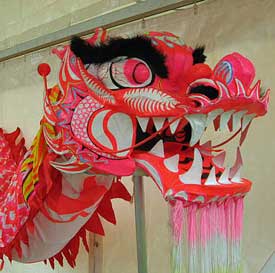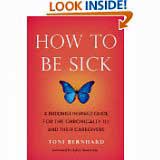Discuss this article on the forums
Written by Cort

The Quality of Life Blogs
This is the start of a series of blogs on Toni Bernhardt’s book “How to be Sick: A Buddhist Inspired Guide for the Chronically Ill and Their Caregivers”. I will supplement my background with a more Western approach with Toni’s Buddhistic approach – and see what happens.
Tony came down with CFS during a ‘romantic’ or at least planned for romantic trip to Paris in 2001. Unfortunately whatever she got she got on the plane ride over. I’m going to skip Chapter I and II on how much fun it is to spend your long awaited European vacation watching trashy French TV (the only kind apparently!) while stuck in your bedroom and then the progression of her illness (got better/got worse/stayed worse) in California.
I think the poem in the Preface probably sums up what this book is trying to accomplish:
Nighttimes falls and the water is flooded with moonlight
Here in the Dragon’s Jaws
Many exquisite jewels
Setcho Juken
Here we are stuck in the Dragon’s Jaws with CFS but are exquisite jewels to be had there? Setcho Juken promises us there are.
Challenges – Toni then spelled out the challenges virtually everybody faces with this illness.
• Coping with symptoms that just won’t go away.
• Coming to terms with a more isolated life
• Weathering fear about the future.
• Facing the misunderstanding of others
• Dealing the health care system
Good strong challenges for any Buddhist or saint to be (or any human being) to take on. :)
Toni starts off the second section -Accepting Pain with another poem that again highlights some of the same key aspects of our journey; the first of which is that the journey is into the ‘darkness’ , so to speak. That is the path of illness; when the path is dark we must find a way to travel in the darkness and understand it but if we can do that we can find that the darkness too ‘blooms and sings’ – in its own peculiar way.
To know the dark, go dark. Go without sight
And find that the dark, too, blooms and sings
And is traveled by dark feet and dark wings….
Wendell Berry
But how to embrace the dark?
East – Dukka – The Buddha says one way to do that is through understanding- the first and most noble truth of all the Buddha’s truths…- Dukka! Or as it’s often been translated “Life is suffering”. This insufficient translation has, no doubt, caused countless spiritual seekers to simply look elsewhere. But the meaning is more subtle than that. Dukka points to the central mistake we, as humans make, which ironically, lies in our desire not to suffer. Yes, it is our attempt to avoid suffering that causes us to suffer and this is the Second Noble Truth of Buddhism – suffering arises from our desire or our ‘thirst’ to have thing be a certain way and our unwillingness to allow it to be any other way.
You’ll lose but only 100% of the time
Byron Katies
West – Being – Which suggests that suffering arises out of a rupture of Be-ing.. or out of our inability to ‘allow’ a situation to be just as it is. The key word, of course, is ‘allow’. Can we allow ME/CFS to be? Can we allow the consequences of ME/CFS – reduced financial resources or even poverty, relationships that disappear, lost dreams and ambitions…..… to be as they are or do we struggle against them? The problem, of course, is that they really are THAT way! My ‘career’ never got started…..I am dependent on my family financially. I frequently have head pains….my body frequently hurts…..I rarely feel ‘well’. ME/CFS gets pitiful funding……
In EST they used to call this being ‘whole and complete’ with something. Can I be whole and complete and allow these things to be just as they are (and are not)? Sometimes I can and I feel peace and most other times anger and upset rises (and with it discomfort and pain). This will take work.
John Travis
 What an amazing statement that is by John Travis. We’ve all had our hearts broken by our search to AVOID suffering…..My guess, though, is that we’re like spiritual tuning forks set to being whole and complete; so long as we veer off the path the fork is going to vibrate causing us pain; but so long as we can ‘accept’ or be ‘whole and complete’ with a situation we will find peace.
What an amazing statement that is by John Travis. We’ve all had our hearts broken by our search to AVOID suffering…..My guess, though, is that we’re like spiritual tuning forks set to being whole and complete; so long as we veer off the path the fork is going to vibrate causing us pain; but so long as we can ‘accept’ or be ‘whole and complete’ with a situation we will find peace.
As Werner Erhard said – we don’t often get what we want. Even healthy people don’t often get what they want and their expectation that they should leads to frustration and upset……but if you start choosing what you have – that’s a whole different ballgame.
Life works when you choose what you got
Actually what you got is what you chose
To move on, choose it
Werner Erhard
I look forward to reading Toni’s book and working with the tools Buddhism has developed to create happiness and well-being. They were designed for everybody; they are surely easier to use when we are well – but just as applicable when we are not.
